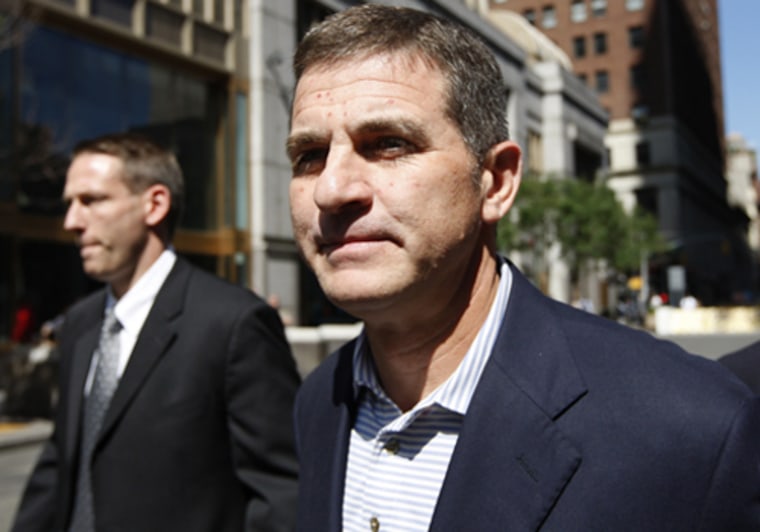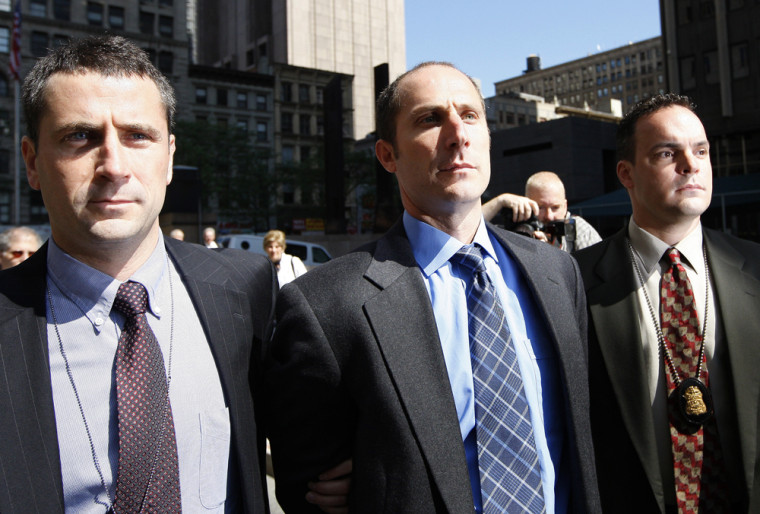The federal government's multipronged response to the mortgage mess Thursday was intended to send a strong message to lending industry while helping to restore the trust of investors and consumers as the economy remains mired deep in a housing-led slump.
But it remains to be seen how effective that response will be in righting the upended financial markets and protecting home buyers from predatory lenders in the future.
Federal authorities announced the indictment of hundreds of housing developers, mortgage lenders and brokers, lawyers, real estate agents and appraisers around the country, while two Wall Street fund managers who sold mortgage-backed investments were arrested in a separate but related case.
“This operation is an example of our unified commitment to address this significant crime problem," FBI Director Robert Mueller told reporters at a press conference. "The FBI will continue to direct investigative and analytic resources towards mortgage fraud and corporate securities fraud that threaten our nation's economy."
The investigation is ongoing and also involves some 19 companies involved in mortgage lending, Mueller said. But Thursday's announcements underscored that the wave of mortgage fraud that swamped the housing industry and credit markets in the past few years was not the work of a few isolated bad actors.
“It makes clearer that the causes of the credit problems are very broad-based and can’t be put at the feet of one player,” said Mark Zandi, senior economist at Moody’s Economy.com. “And that everyone was involved to some degree or another — borrower, lender, investment banker — all the way top to bottom.”

The arrests also heighten the debate over proposed legislation and regulatory changes that has been under way on Capitol Hill since the turmoil in the mortgage market spilled over to the financial markets last August. Opponents of tougher regulation and government housing relief maintain that the recent in surge in foreclosures resulted largely from unsophisticated borrowers reaching too far and getting in over their heads — and that taxpayer money should not be used to bail out those borrowers.
But proponents argue that lax regulation contributed heavily to the problem.
“You would think that in June of 2008, given what we knew in June of 2007 and June of 2006 that we would now have on the books very strong laws that would prohibit these kinds of activity,” said John Taylor, president of the National Community Reinvestment Coalition, which has been lobbying for such laws.
Even as the government was announcing criminal actions and calling for tougher regulations, Congress was debating a comprehensive housing relief bill that’s been in the works for over a year. The White House said Thursday that President Bush would veto the package as conservative Republicans worked to block the measure amid a scandal over cut-rate mortgages for senators.
Allegations have recently been made that Sens. Christopher Dodd, D-Conn., and Kent Conrad, D-N.D., got cut-rate home loans from Countrywide, a leading subprime lender at the center of the mortgage meltdown. Both have said they neither asked for nor knew about the special treatment.
The government’s response to the mortgage mess that has cost millions of Americans homes is following two major tracks.
One focuses on the process by which Wall Street packaged these loans and sold them to investors, offloading the risk that shaky loans would go bad. That effort brought the arrest and indictment of two former Bear Stearns hedge fund managers on conspiracy and securities fraud charges.
The collapse of two funds they oversaw last summer helped kick off the credit crisis that continues to weigh on financial markets and the economy. Prosecutors say the managers lied about the funds' prospects even as they privately voiced concerns about the funds’ viability.
Investors' uncertainty about the value of hedge fund holdings was a major factor in the meltdown in the credit markets and the collapse of Bear Stearns. That sparked an ongoing debate about the need to tighten regulations on fund activities and disclosures on their holdings.
“When we had these problems in the Depression, that's when these original regulations were put into place,” said Thom Hall, a partner with Financial Strategies Institute in Salt Lake City. “Now the market has developed new strategies outside of the regulatory field. That's where we ended up with leverage 60 times investments, and then we had the collapse.”
As the arrests of the Bear Stearns fund managers were being announced, Treasury Secretary Hank Paulson was urging that the Federal Reserve be given more authority to step in to protect the financial system if its stability is threatened.
But Paulson said it was unlikely that lawmakers would be able to agree this year on proposals to boost the Fed's oversight of investment banks.
The other major component of the Justice Department’s effort to combat mortgage fraud focuses on the retail end of the chain, where lax lending led to a variety of abuses. In some cases phony buyers defrauded lenders, while in other cases mortgage brokers sold ruinous loans to borrowers, some of whom were steered to more expensive “subprime” loans even though they qualified for safer, cheaper loans.
The FBI operation, involving dozens of field offices and hundreds of agents, follows a sharp rise in so-called “suspicious activity reports” that banks and lenders are required to file when they suspect a financial crime has taken place. Banks reported 53,000 such cases last year, up from 37,000 in 2006 and nearly 10 times the level seen in 2002.
Hundreds of mortgage fraud cases already have been prosecuted, and some states also have been actively investigating fraud. The cases announced Thursday covered a wide range of mortgage scams that have become well-known to state and federal prosecutors. Alleged victims included lenders, renters and homeowners facing foreclosure.
The FBI’s high-profile announcement that over 400 people have been arrested since March in the sting dubbed “Operation Malicious Mortgage” helped underscore the scope of the criminal activity that was at the heart of the mortgage meltdown. About 150 agents have been working on some 1,300 mortgage fraud cases.
Sixty people were arrested on Wednesday alone in Chicago, Miami, Houston and a dozen other regions policed by the FBI.
A dozen people were arrested in the Atlanta area, accused of buying and selling condos at artificially inflated prices, according to NBC affiliate WXIA. The scheme allegedly involved an attorney, mortgage brokers, an appraiser and an IRS employee who posed as a fake buyer.
The group allegedly sold and resold many of the 144 units to one another, pocketing the cash and never paying on the loans. Renters who were also bilked had no idea their landlords weren’t making mortgage payments, prosecutor said.
“They don’t want money orders, they don’t want nothing — no type of money trail. They just ask for cash,” Blue Sky Condominiums resident Ben Winters said. “You pay it, and they leave.”
In Houston, six people were charged with defrauding banks and stealing $24 million, NBC affiliate KPRC reported. The ring worked by recruiting people with good credit to act as buyers in fraudulent mortgage deals, prosecutors said. The indictment alleges phony buyers were recruited to apply for loans to buy pricey condominiums in Houston and surrounding suburbs.
Prosecutors said a Maryland businessman bilked his customers out of their homes and their equity while they thought he was saving them from foreclosure. Television ads were used to target victims like Claretta Taylor, who told NBC affiliate WBAL of Baltimore she was suspicious but desperate.
“My gut feeling told me not to go ... but I was in a desperate situation. I needed help,” Taylor said.
